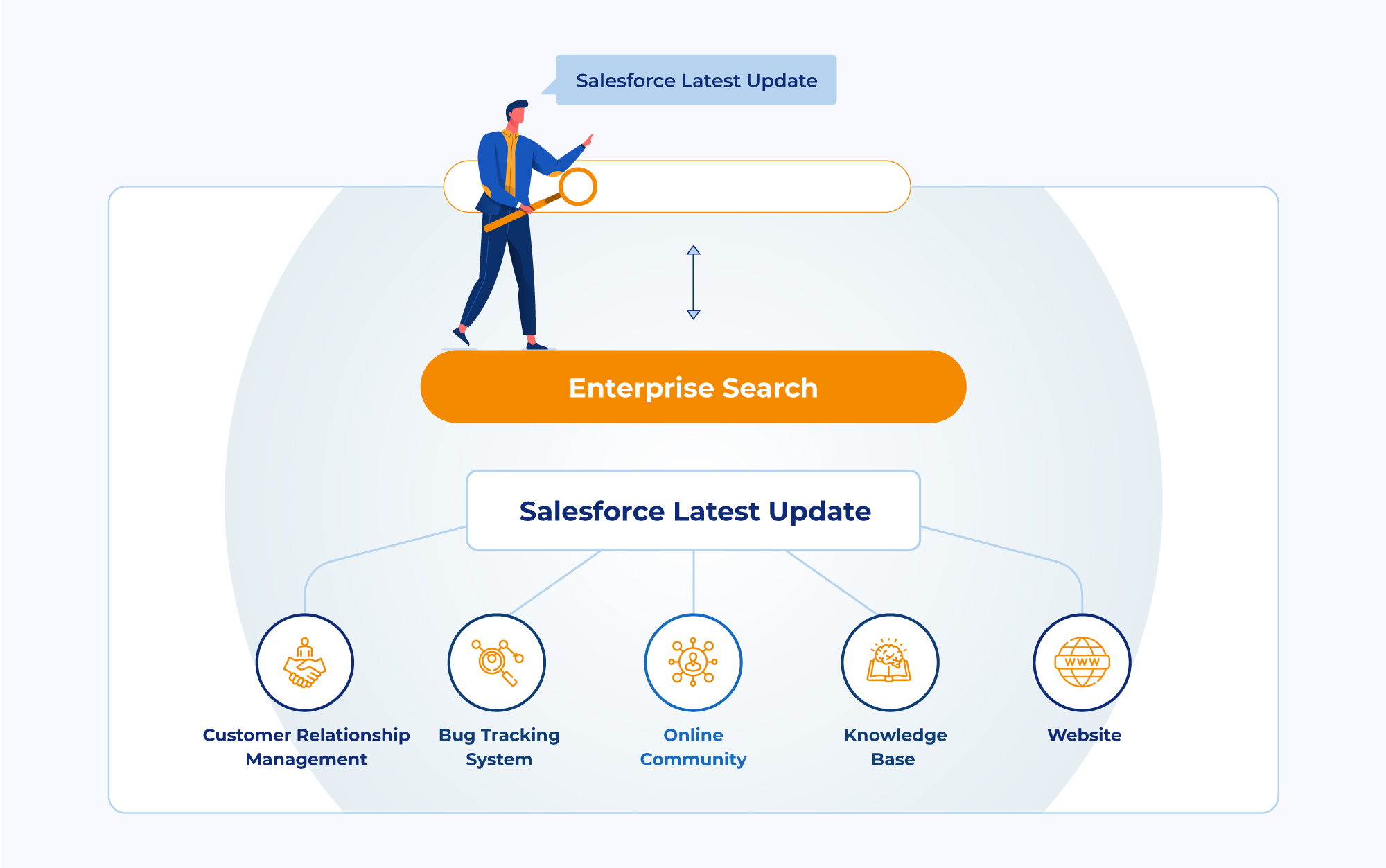
In the world of business complexity, a story unfolds where employees and customers struggled to navigate a maze of information, desperately seeking guidance. Their efforts often went in vain, leaving them frustrated as they couldn’t find what they needed. Productivity suffered, frustrations grew, and the company’s effectiveness plummeted.
But then, a hero emerged: Enterprise Search! With its remarkable abilities, it brought order to the chaos and connected disparate content sources for a unified view of information. Productivity soared, efficiency improved, and everyone celebrated the company’s success.
In this blog post, we are going to discover why Enterprise Search is an essential tool for organizations striving for success. Let’s get started.
But First Things First—What is Enterprise Search?
The global enterprise search market reached a value of US$ 4.46 Billion in 2021.
Enterprise search is a powerful information retrieval system that enables organizations to efficiently search, discover, and access a wide range of structured and unstructured data scattered across various repositories, including databases, documents, emails, and more.


It simplifies and accelerates the process of finding relevant information, enhancing productivity, decision-making, and collaboration within the enterprise.
So, How Does it Work?
Enterprise search involves crawling and retrieving information from various sources and indexing it to create a searchable index with keywords and metadata. Users submit queries, which are compared to the indexed data to deliver relevant results using relevance ranking algorithms.
Advanced features such as filtering, faceted search, and natural language processing enhance the search experience, enabling users to refine their queries and discover insights more effectively.
Here’s an example for you:
Imagine a large multinational company with numerous departments and a vast amount of data spread across different systems and platforms. With enterprise search, employees can simply enter a keyword or phrase in a search bar, and the system quickly scours through all available data sources, such as databases, intranets, file shares, and emails.
The search results are then presented in a consolidated and organized manner, displaying relevant documents, files, and even contextual information. Users can refine their search, apply filters, and navigate through the results to find precisely what they’re looking for.
This streamlines information retrieval, saves time, and enables employees to access critical knowledge and insights with ease, enhancing productivity and efficiency within the organization.
Advanced enterprise search solutions leverage large language models (LLMs), as mentioned above. But you may be wondering how?
How LLMs Act as Catalysts for the Future of Enterprise Search
Large Language Models are transforming enterprise search solutions by revolutionizing the way organizations access and utilize information. Let’s see what areas they help enhance.
- Refined understanding: Understanding natural language and its nuances is an area where LLMs excel, allowing them to comprehend complex queries and enable more accurate and relevant search results.
- Improved user experience: LLMs enable hyper-personalized search experiences by understanding user intent and delivering tailored results and recommendations.
- Advanced semantic search: Leveraging LLMs can majorly heighten semantic search capabilities, enabling boosted contextual information retrieval.
- Efficient data navigation: Navigating through vast amounts of structured and unstructured data for quick and accurate retrieval of information from multiple sources is a walk in the park for LLMs.
- Streamlined knowledge management: LLMs facilitate efficient knowledge retrieval and organization, which help in accelerating decision-making processes.
Top Use Cases for Enterprise Search
Enterprise search plays a crucial role in diverse scenarios within the rapidly changing modern business landscape.
Enterprise Search for Community Managers
Enterprise search is a valuable resource for community managers, providing a gateway to self-service and meeting the expectations of consumers.
Research shows that 83% of customers would use an online community for self-service support if it was available.
AI-powered algorithms enhance search relevance by analyzing user queries and understanding their intent. These tools also offer insights, such as identifying content gaps, enabling managers to improve user experience and build stronger relationships with their audience.
With actionable insights at their disposal, community managers can create engaging and user-friendly communities.
Enterprise Search for Knowledge Managers
Knowledge Managers play a vital role in facilitating access to essential information for employees to excel in their roles.
Leveraging a powerful language model, enterprise search is enhanced by organizing the knowledge base, enabling employees to easily locate relevant information. This efficient system accelerates the knowledge management process, empowering knowledge managers to achieve their objectives seamlessly.
Additionally, the model streamlines data retrieval from various platforms, ensuring quick and accessible information discovery.
Enterprise Search for Customer Support
Customer support is a prominent sector that heavily relies on enterprise search. While self-service options are valuable, some customers prefer interacting with live agents.
Surveys show that 41% of consumers favor live chat, which also boasts a high customer satisfaction rate of 71%.
Support agents often face the challenge of searching for information across various sources. Retrieving this data promptly ensures shorter wait times and enhances the overall customer experience.
Leveraging LLMs enables swift information retrieval, significantly impacting the time to resolution (TTR). Subsequently, it helps prevent escalations and boosts the motivation of customer support agents to proactively address customer needs.
Enterprise Search for Customer Success
Enterprise search backed by AI and ML provides critical insights that allow companies to provide personalized solutions. For instance, a customer may be searching for a particular issue on your community portal. Based on their search history, AI algorithms will be able to provide them with better results going forward.
As a result, customer engagement becomes personalized and improves the overall journey. All this is possible thanks to faster resolutions, an efficiently managed knowledge base, and intelligent insights powered by LLMs.
Take AI-Powered Enterprise Search for a Test Drive With SearchUnify!
Embracing LLM-powered enterprise search is a cakewalk with SearchUnify, a enterprise agentic platform!
Check out our free 7-day trial to take the initial steps into the world of enterprise search and slowly build up to incorporating it into your workspace full-time!